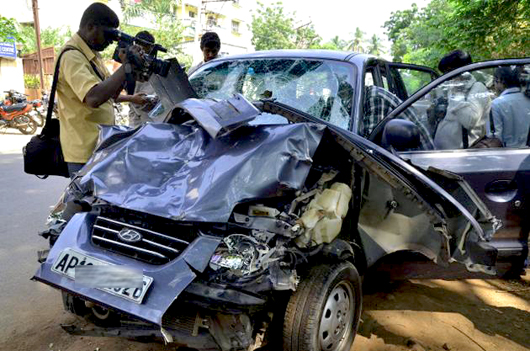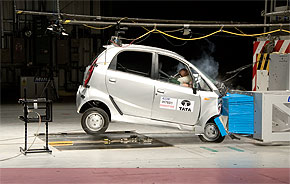
New Delhi, Jan 31: Some of the most popular small cars sold in India, including Maruti Alto 800, Tata Nano, Ford Figo, Hyundai i10 and Volkswagen Polo, have failed crash tests showing high risk of life-threatening injuries in road accidents, according to Global NCAP.
As per the tests done by Global NCAP, an independent charity based in UK focused on consumer orientated vehicle safety initiatives, these cars received zero for adult protection ratings in a frontal impact at 64km/hr.
The combined sales of these five cars account for around 20 per cent of all the new cars sold in India last year, Global NCAP said.
As per Society of Indian Automobile Manufacturers, total car sales in India stood at 18,07,011 units in 2013.
Global NCAP Chairman Max Mosley said: "Poor structural integrity and the absence of airbags are putting the lives of Indian consumers at risk. They have a right to know how safe their vehicles are and to expect the same basic levels of safety as standard as customers in other part of the world."
India is now a major global market and production centre for small cars, so it's worrying to see levels of safety that are 20 years behind the five-star standards now common in Europe and North America, he added.
When contacted, spokespersons of the companies named said their products met Indian safety norms.

"The extent of the structural weaknesses in these models were such that fitting airbags would not be effective in reducing the risk of serious injury," it said.
Ford Figo and Volkswagen Polo had structures that remained stable – and, therefore, with airbags fitted, protection for the driver and front passenger would be much improved, it added.
Global NCAP said it also assessed the same models against the UN's basic crash test of 40 per cent offset frontal impact test at 56km/hr, now widely applied by major manufacturing countries and regions, including Australia, China, European Union, Japan and Malaysia.
"All but one of the cars tested failed to pass even this minimum standard," it said.
The Global Plan for the UN's Decade of Action for Road Safety recommends that all Member States apply this standard, although it is not yet applied in India.
Calling for India to follow minimum crash safety standards, Institute of Road Traffic Education (IRTE) President Rohit Baluja said: "These results show that India would benefit enormously from the introduction of minimum crash safety standards and clearer information for consumers about the protection new cars offer."
Many cars made in India for export meet these standards already, so it's not a question of know-how or capability: India's automobile industry just needs the right incentives, he added.
Commenting on the Global NCAP findings, Tata Motors Head – Advanced and Product Engineering, Engineering Research Centre, Tim Leverton said safety is of paramount importance to Tata Motors.
"All our vehicles, including the Tata Nano meets all Indian safety regulations, including the frontal barrier crash test at 48 kmph, as mandated by the government. All our cars on Indian roads, including the Nano are engineered for safety in view of Indian road and traffic conditions," he added.
A Hyundai Motor India spokesperson said: "Hyundai Motor India Ltd affirms that Hyundai vehicles are designed and build to meet all the prescribed safety standards set by Indian Regulatory Authorities."
Commenting on the development, a Ford India spokesperson said safety is one of the highest priorities in the design of the company's vehicles.
"Our vehicles consistently meet or exceed applicable industry safety standards. We are monitoring the progress of this review and will work with Indian authorities, GNCAP and the other relevant stake holders as appropriate," she added.
Volkswagen Passenger Cars, Volkswagen Group Sales India, Managing Director Arvind Saxena said the company is happy that the Volkswagen Polo has secured a four-Star safety rating for adult occupant protection.
"With our recent introduction of dual front airbags as standard fitment on all variants of the Polo in India, the Polo is now the safest premium-segment hatchback in the country. We believe this demonstrates Volkswagen's commitment to building better, safer cars for the Indian consumer," Saxena added.







Comments
magnificent points altogether, you just received a new reader.
What could you suggest about your post that you simply
made a few days ago? Any sure?
Stop by my blog post - google
plus adwords: http://Gek.Szie.hu/alumni/node/47739
Add new comment